Politics
As guns fall silent, Gazans find newly reopened banks with no cash
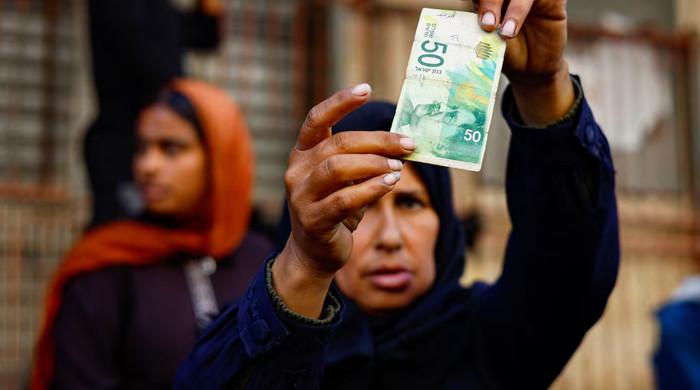
The ceasefire in Gaza has eased the trauma of Israel’s air strikes and blockade but a shortage of cash has left Palestinians unable to spend what little money they have without falling victim to wartime profiteers.
Banks, many damaged or destroyed along with homes, schools and other institutions across Gaza during two years of war, began reopening on October 16, six days after the ceasefire was announced. Queues soon formed but people came away disappointed.
“There is no money, liquidity at the bank,” said father-of-six Wael Abu Fares, 61, standing outside the Bank of Palestine. “You just come and do paperwork transactions and leave.”
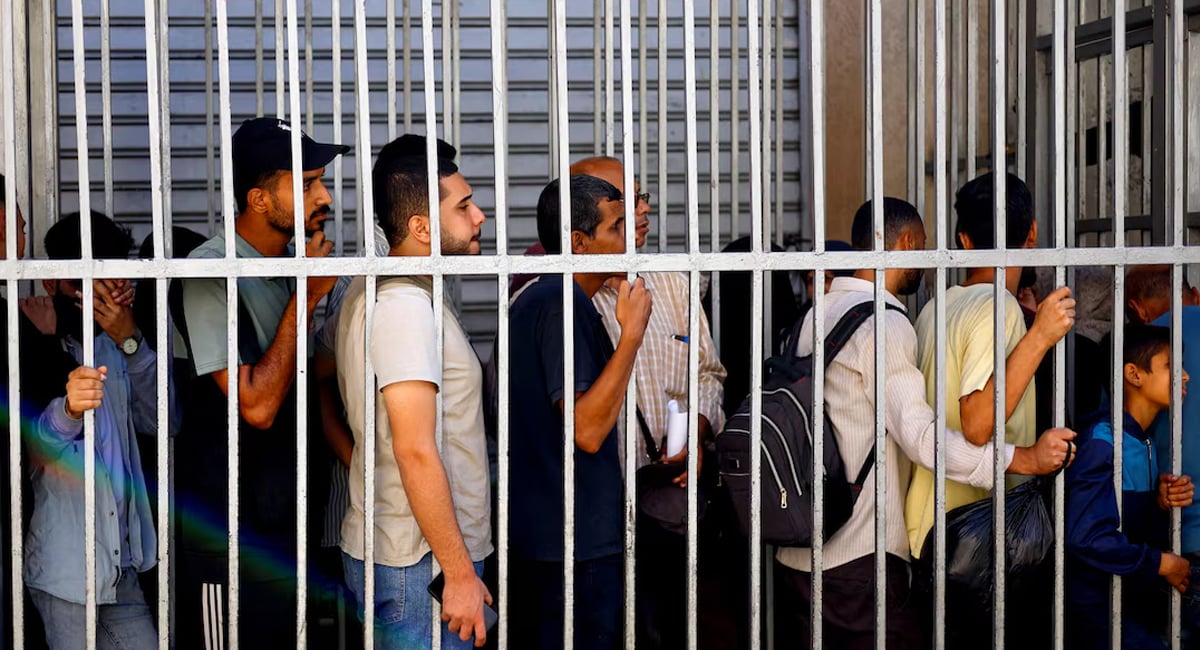
People need cash for most everyday transactions in Gaza, whether to buy food in the market or pay utility bills, but Israel blocked transfers of banknotes along with most other goods following the attack and mass hostage-taking by Hamas-led fighters in October 2023.
Huge fees to cash salaries
“Banks are open, Air conditioning is on, but they are mostly doing electronic business, no deposits, no withdrawals of cash,” Gaza economist Mohammad Abu Jayyab told Reuters.
“People go to some greedy merchants to cash their salaries and they give them cash for a huge fee, which ranges between 20% and sometimes goes to 40%.”
Mother-of-seven Iman al-Ja’bari longs for a time when transactions at banks used to take less than an hour.
“You need two or three days to go back and forth, back and forth, spending your whole life standing there,” she said. “And in the end, you only get 400 or 500 shekels ($123 or $153). What can this (amount) buy with the incredibly high prices today that we can’t afford?”.
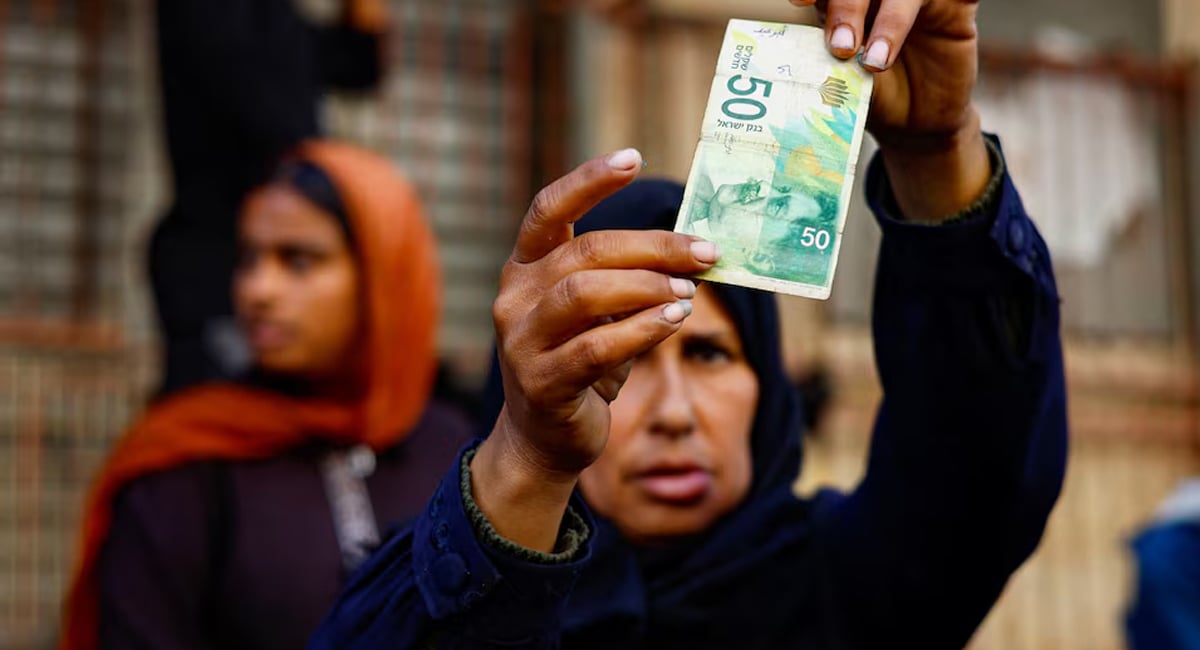
For a few Palestinians, the cash crunch has provided an opportunity to eke out a living. Manal al-Saidi, 40, repairs damaged banknotes to cover some basic needs.
“I work and I make 20, 30 shekels ($6, $9), and I leave with a loaf of bread, beans for dinner, falafel, anything, something simple,” she said, wiping notes.
“Not that I can get (afford) vegetables or anything, no, just enough to get by.”
Some people resort to electronic transfers through bank apps for even small items such as eggs or sugar, but the sellers apply additional fees.
The issue of cash supplies into Gaza was not included in US President Donald Trump’s 20-point peace plan, which also left the details of reconstruction and security to be decided.
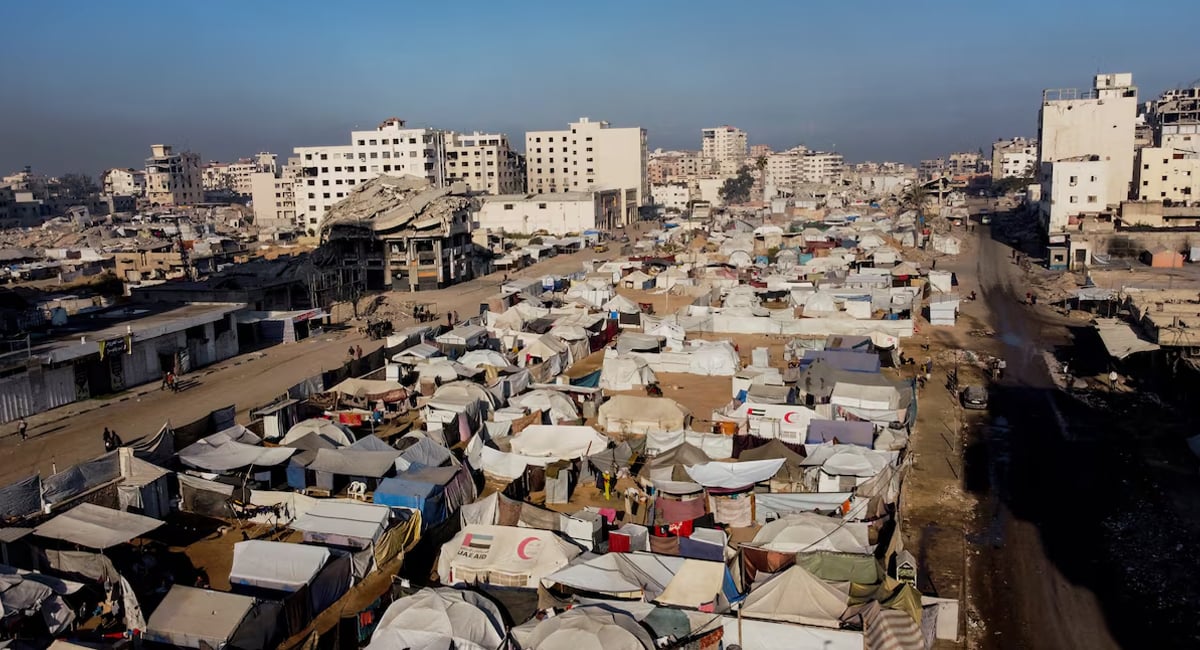
COGAT, the arm of the Israeli military that oversees aid flows into the Gaza Strip, did not immediately respond to a request for comment on whether or when banknotes may be allowed back in.
The shortage of notes and coins has compounded the crisis for Gazans who have lost relatives, jobs and homes, used up their savings and sold their possessions to buy food, tents and medications. Some have resorted to barter to get by.
Palestinian merchant Samir Namrouti, 53, has got used to banknotes that are almost unrecognisable through overuse.
“What matters to me is its serial number. As long as its serial number is there, that’s it, I treat it as money,” he said.
Header image: Palestinian woman Manal al-Saidi repairs damaged banknotes on the side of a street, amid a cash crisis, in Nuseirat, central Gaza Strip, October 27, 2025. — Reuters
Politics
New York City joins UN health network after Trump withdrew US from WHO
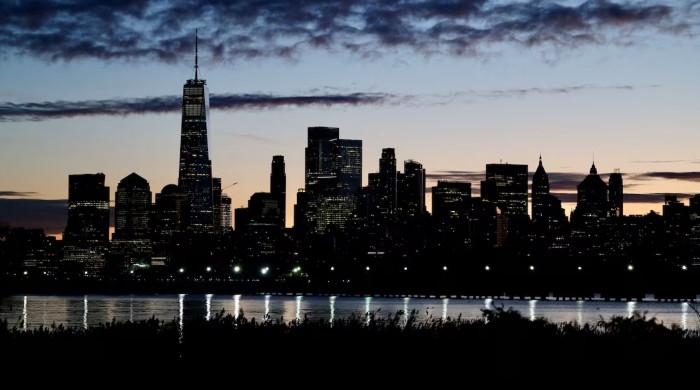
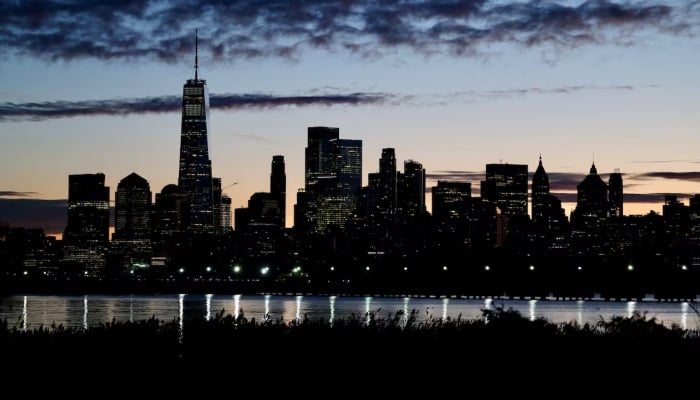
WASHINGTON: The New York City Health Department on Wednesday said it has joined the World Health Organisation’s global outbreak response network following President Donald Trump’s withdrawal of the US from the UN health agency.
Why’s important
Following the Republican president’s decision to pull the US out of the WHO, some Democratic leaders have made their regions join the WHO’s Global Outbreak Alert and Response Network (GOARN) in defiance of Trump. New York City Mayor Zohran Mamdani has been critical of the president’s policies.
California Governor Gavin Newsom and Illinois Governor JB Pritzker, both Democrats, have also said their states will join the WHO’s global outbreak response network. The network responds to public health events around the world, such as pandemics and disease outbreaks, and comprises of more than 360 technical institutions.
Key quotes
“By joining GOARN, New York City gains access to a global network of over 360 institutions and organisations that respond to acute public health events with the deployment of staff and resources to affected countries,” the NYC Health Department said in a statement.
“Infectious diseases know no boundaries, and nor should the information and resources that help us protect New Yorkers,” New York City Acting Health Commissioner and Chief Medical Officer Michelle Morse added.
Context
The US formally left the WHO last month after completing a one-year waiting period following an executive order that Trump signed in January 2025.
Since taking office, Trump has withdrawn the US from dozens of global and UN entities, saying they do not benefit Washington. His steps have been condemned by health and human rights experts.
Politics
Ukraine says Abu Dhabi talks with Russia ‘substantive and productive’
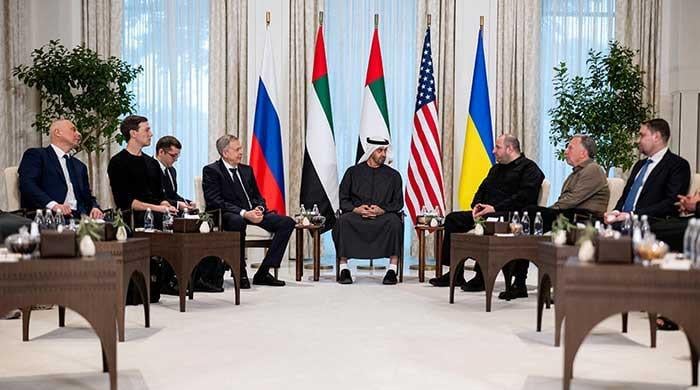
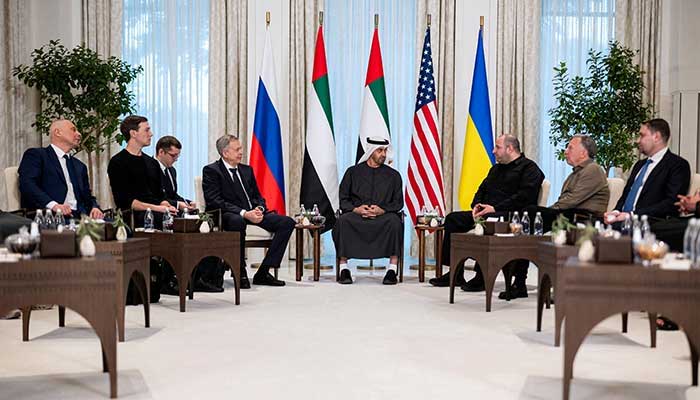
The first day of talks between Ukraine, Russia and the United States seeking to broker an end to the war in Ukraine concluded Wednesday in Abu Dhabi with Kyiv describing the negotiations as “substantive and productive”.
While there was no apparent breakthrough in the most recent round of discussions, the negotiations were set to carry on into a second day, Kyiv said.
The US-mediated talks are the latest in a flurry of diplomacy that has so far failed to strike a deal to halt the war, unleashed by Russia’s February 2022 invasion.
The war has spiralled into Europe’s deadliest conflict since World War II, with hundreds of thousands killed, millions forced to flee their homes in Ukraine and much of the eastern and southern part of the country decimated.
The talks were going on Wednesday as stepped-up Russian strikes on Ukraine’s power infrastructure left Kyiv residents in darkness and cold, with temperatures dropping as low as -20C.
But though the massive barrage threatened to overshadow progress, Ukraine’s top negotiator Rustem Umerov said the talks the first day were “substantive and productive, focused on concrete steps and practical solutions”.
As talks got underway, the Kremlin repeated its hardline demand that Kyiv give in if it wanted the four-year invasion to end.
“Our position is well known,” Kremlin spokesman Dmitry Peskov told reporters on Wednesday as the talks got underway.
“Until the Kyiv regime makes the appropriate decisions, the special military operation continues,” he said, using Russia´s term for the offensive.
In Ukraine, foreign ministry spokesman Georgiy Tykhy said Kyiv was “interested in finding out what the Russians and Americans really want.”
The content of the talks was on “military and military-political issues,” he added, without elaborating.
The main sticking point in settling the conflict is the long-term fate of territory in eastern Ukraine.
Moscow is demanding that Kyiv pull its troops out of swathes of the Donbas, including heavily fortified cities atop vast natural resources, as a precondition of any deal.
It also wants international recognition that land seized in the invasion belongs to Russia.
Kyiv has said the conflict should be frozen along the current front line and has rejected a unilateral pull-back of forces.
Trump dispatched his ubiquitous envoy Steve Witkoff and son-in-law Jared Kushner to try to corral the sides to an agreement.
Russia’s top negotiator is military intelligence director Igor Kostyukov, a career naval officer sanctioned in the West over his role in the Ukraine invasion.
Europe fears it has been sidelined in the process, even as France and Britain lead efforts to put together a peacekeeping force that could be deployed to Ukraine after any deal.
It was “strategically important for Europe to at some point be part of the negotiations,” the EU’s ambassador to Ukraine Katarina Mathernova told AFP on Wednesday in Kyiv.
Russia occupies around 20% of Ukraine, but Kyiv still controls around one-fifth of the Donetsk region.
Ukraine has warned that ceding ground will embolden Moscow and that it will not sign a deal that fails to deter Russia from invading again.
Russia also claims the Lugansk, Kherson and Zaporizhzhia regions as its own, and holds pockets of territory in at least three other Ukrainian regions in the east.
‘Prepare for the worst’
On the battlefield, Russia has been notching up gains at immense human cost, hoping it can outlast and outgun Kyiv’s stretched army.
Russian shelling of a market square in the frontline town of Druzhkivka killed seven on Wednesday, Ukrainian regional authorities said.
Following the first round of US-brokered talks in Abu Dhabi last month, Ukrainians were sceptical that a deal could be struck with Moscow.
“I think it’s all just a show for the public,” Petro, a Kyiv resident, told AFP.
“We must prepare for the worst and hope for the best.”
On the streets of Moscow, some were more hopeful.
“Everyone hopes, everyone is very optimistic about these negotiations,” says Larisa, a retiree who said she had family in Ukraine and relatives fighting at the front.
“It has to end one day, everyone’s had enough,” said Anton, a 43-year-old engineer.
Politics
Xi calls for ‘mutual respect’ with Trump, hails ties with Putin
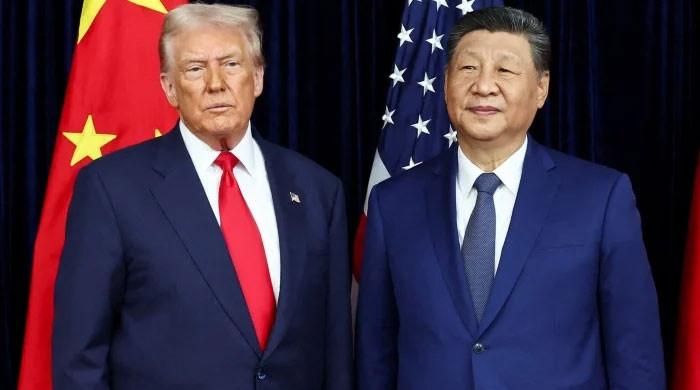
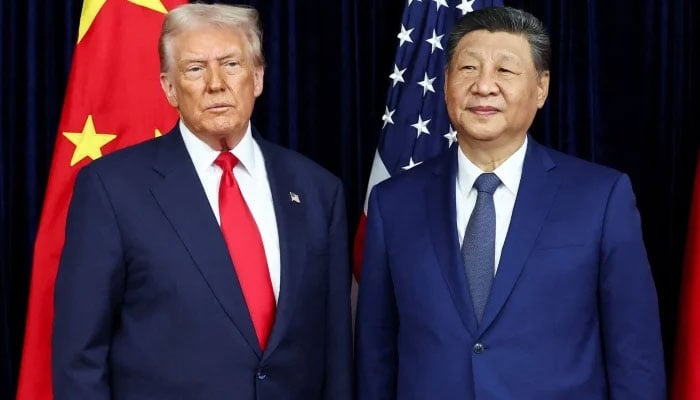
- Xi urges peaceful coexistence and win-win cooperation with US.
- Trump says US-China relationship is “extremely good” after call.
- Trump looks forward to planned trip to China, discusses trade, Iran.
Chinese leader Xi Jinping called Wednesday for “mutual respect” in strengthening relations with the United States, warning President Donald Trump in a phone call to use “caution” when selling arms to Taiwan, Beijing’s state media reported.
Xi expressed the hope that bilateral issues — amongst which trade figures highly — could be resolved amicably between the world’s two largest economies.
“By tackling issues one by one and continuously building mutual trust, we can forge a right way for the two countries to get along,” Xi said, according to state broadcaster CCTV.
“Let us make 2026 a year in which China and the United States, as two major countries, move toward mutual respect, peaceful coexistence, and win-win cooperation,” he added.
Trump, in a post on his Truth Social platform following what he called an “excellent” call, said ties between the two countries were “extremely good”.
“The relationship with China, and my personal relationship with President Xi, is an extremely good one, and we both realise how important it is to keep it that way,” Trump said.
The president said he and Xi discussed trade, Taiwan, the Russian war against Ukraine, and Iran, as well as a planned trip to China, which he said “I very much look forward to”.
On Taiwan, however, Xi warned Washington to exercise caution in arms sales to the island.
“The Taiwan question is the most important issue in China-US relations… The US must handle arms sales to Taiwan with caution,” Xi said, according to state broadcaster CCTV.
The United States approved $11 billion-worth of arms to Taiwan in December, Taipei said.
Putin’s ‘dear friend’
Speaking by video call several hours earlier, Xi and Putin hailed the strengthening of Chinese-Russian ties.
The two countries have sought to present a united front against the West, with ties deepening since Moscow´s 2022 invasion of Ukraine.
A Kremlin aide said the Xi-Putin call was “friendly and trusting” and lasted nearly an hour and a half.
Moscow has increasingly relied on China throughout the Ukraine conflict to keep its economy afloat, faced with crippling Western sanctions.
“Since the beginning of the year, the international situation has become increasingly turbulent,” Xi told Putin, calling for “deeper” Chinese-Russian coordination, according to state TV.
Addressing Xi as his “dear friend”, Putin voiced a similar message, in a video broadcast on Russian state TV.
The Kremlin said Putin had accepted invitations to visit China in the first half of 2026 and attend the APEC regional summit hosted by Xi in November.
Xi also reiterated his commitment to the international system with the United Nations at its core, after Trump in January unveiled plans for a “Board of Peace” that critics see as an attempt to rival the UN.
The calls took place as Russian, Ukrainian and US negotiators met in Abu Dhabi for a new round of talks on ending the almost four-year war, which has turned into Europe’s worst conflict since World War II.
Putin and Xi discussed their “opinions” on the United States, views that, according to the Kremlin, “practically matched” each other.
And “special attention was given to the tense situation in Iran”, said Kremlin aide Yuri Ushakov.
The calls follow a series of meetings between Xi and various leaders in recent months, as he consolidates diplomatic support in the face of an increasingly unpredictable United States.
-

 Sports1 week ago
Sports1 week agoPSL 11: Local players’ category renewals unveiled ahead of auction
-

 Entertainment1 week ago
Entertainment1 week agoClaire Danes reveals how she reacted to pregnancy at 44
-

 Sports1 week ago
Sports1 week agoCollege football’s top 100 games of the 2025 season
-

 Business1 week ago
Business1 week agoBanking services disrupted as bank employees go on nationwide strike demanding five-day work week
-

 Politics1 week ago
Politics1 week agoTrump vows to ‘de-escalate’ after Minneapolis shootings
-

 Sports1 week ago
Sports1 week agoTammy Abraham joins Aston Villa 1 day after Besiktas transfer
-

 Tech1 week ago
Tech1 week agoBrighten Your Darkest Time (of Year) With This Smart Home Upgrade
-

 Entertainment1 week ago
Entertainment1 week agoK-Pop star Rosé to appear in special podcast before Grammy’s






